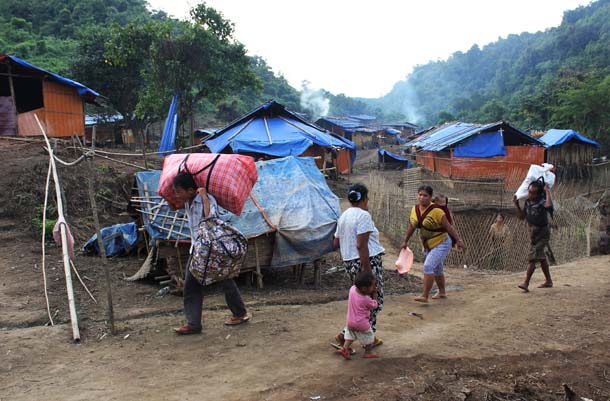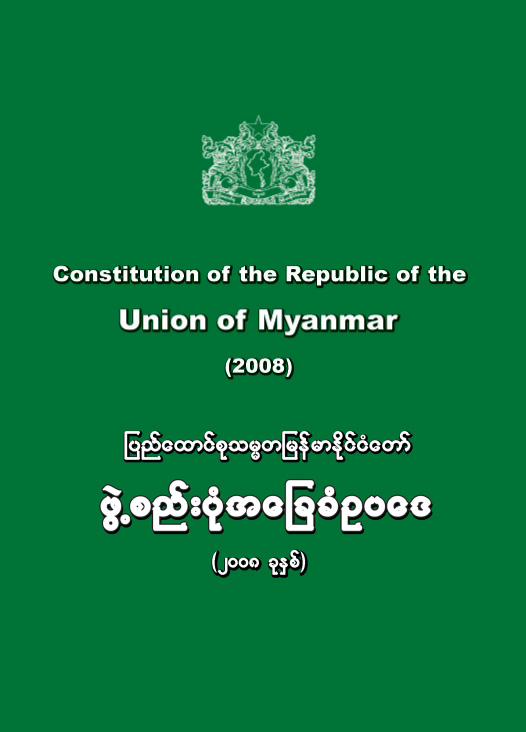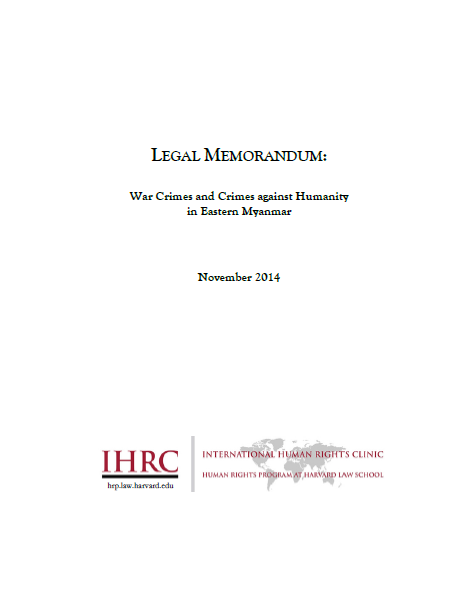Posts Tagged ‘War Crimes’ (25 found)
Deep-rooted Human Rights Challenges Must be Tackled in Myanmar’s New Political era – UN expert
GENEVA (18 March 2016) – Myanmar is a very different country from just a few short years ago, said the United Nations Special Rapporteur on the situation of human rights in Myanmar, Yanghee Lee, warning however of the urgent need to tackle deeply entrenched human rights issues […]
• • •Naypyidaw Must Immediately Stop its Attacks in Central Shan State and Let Communities Return Home
Shan Community Based Organisations (CBOs) strongly denounce the current military offensive by Naypyidaw in central Shan State, which has caused civilian injury and displaced over 6,000 villagers since it began one month ago on October 6 […]
• • •International Human Rights Organizations Call for Accountability of Myanmar’s Minister of Home Affairs
We, the undersigned organizations, call for Lt. Gen. Ko Ko, Myanmar’s Minister of Home Affairs and Minister for Immigration and Population, to be held accountable for his involvement in human rights violations, war crimes, and crimes against humanity. On November 6, 2015, the United Nations Human Rights Council will review Myanmar’s human rights record during its Universal Periodic Review (UPR) in Geneva. Regrettably, the Myanmar Government has appointed Lt. Gen. Ko Ko to head the committee responsible for its UPR process […]
• • •ရကၡိဳင့္တပ္မေတာ္ စစ္႐ံုးခ်ဳပ္ သေဘာထားထုတ္ျပန္ေၾကျငာခ်က္
၂၀၁၅ ခုႏွစ္ ျမန္မာ့ႏိုင္ငံေရးအေျခအေနသည္ အေျပာင္းအလဲအတြက္ အလွည့္အေျပာင္းမ်ားျဖင့္ ျပည့္ႏွက္လွ်က္ရွိၿပီး အေထြေထြေရြးေကာက္ပြဲအား ႏိုဝင္ဘာလ (၈) ရက္ေန႔တြင္ က်င္းပျပဳလုပ္ေတာ့မည္ျဖစ္သည္။ ရကၡိဳင့္တပ္မေတာ္အေနျဖင့္ ၂၀၀၈ ဖြဲ႔စည္းပံုအေျခခံဥပေဒကို လက္မခံေသာ္လည္း အဖိႏွိပ္ခံျမန္မာလူထုတစ္ရပ္လံုးႏွင့္ ရခိုင္ျပည္သူမ်ားအတြက္ ျပည္သူ႔ဆႏၵသေဘာထားႏွင့္အညီ ေရြးေကာက္တင္ေျမႇာက္ထားျခင္းခံရေသာ ျပည္သူ႔ကိုယ္စားလွယ္မ်ားျဖင့္ ဖြဲ႔စည္းထားသည့္အစိုးရတစ္ရပ္အား ယခုက်င္းပမည့္အေထြေထြ ေရြးေကာက္ပြဲမွတစ္ဆင့္ ထြက္ေပၚလာရန္ သံုးသပ္ေမွ်ာ္လင့္ပါသည္ […]
• • •To Recognize and Repair: Unofficial Truth Projects and the Need for Justice in Burma
 The advance towards a free and democratic Burma has so far done little to account for the crimes of its past. Emerging from a military dictatorship and opening its doors to the outside world has certainly led to an increased focus from the international community on the future of the country. As a result of increased scrutiny by the outside world, the U Thein Sein government has repeatedly reiterated their genuine commitment to improving the human rights situation. Despite government statements to the contrary, the situation for human rights defenders, journalists, farmers, land rights activists and civilians particularly in ethnic areas – has not improved […]
The advance towards a free and democratic Burma has so far done little to account for the crimes of its past. Emerging from a military dictatorship and opening its doors to the outside world has certainly led to an increased focus from the international community on the future of the country. As a result of increased scrutiny by the outside world, the U Thein Sein government has repeatedly reiterated their genuine commitment to improving the human rights situation. Despite government statements to the contrary, the situation for human rights defenders, journalists, farmers, land rights activists and civilians particularly in ethnic areas – has not improved […]
Statement by Karen Community Based Organizations Welcoming the Release By The International Human Rights Clinic at Harvard Law School of, “War Crimes and Crimes Against Humanity in Eastern Myanmar” It’s Time For Justice
The Karen people have suffered decades of abuse at the hands of the various forms of the Burmese dictatorship and Burmese military. We have grown up witnessing rape, murder, forced labor, destruction of villages, bombing of civilians and a wide variety of other human rights abuses. We know there are those who ordered those abuses who continue to serve in the highest levels of the Government of Burma and in the Burmese military. We live this experience. We continue to seek a full investigation and the prosecution of those responsible.
• • •How Many More Lives? Burma Army Must Immediately Halt its Offensives in Kachin State
 Despite repeated calls from the international community, governments and civil society for an immediate halt to hostilities in Kachin and northern Shan State, on 19 November, 2014 the Burma Army fired several artillery missiles as “warning shots” onto the Kachin Independent Army’s (KIA) training academy in Laiza, Kachin State, killing 23 cadets and seriously injuring 20 others. Laiza is not only the KIA’s strong-hold. It is a city with over 20,000 civilians and a host to over 17,000 internally displaced persons (IDPs).
Despite repeated calls from the international community, governments and civil society for an immediate halt to hostilities in Kachin and northern Shan State, on 19 November, 2014 the Burma Army fired several artillery missiles as “warning shots” onto the Kachin Independent Army’s (KIA) training academy in Laiza, Kachin State, killing 23 cadets and seriously injuring 20 others. Laiza is not only the KIA’s strong-hold. It is a city with over 20,000 civilians and a host to over 17,000 internally displaced persons (IDPs).
Just days after the killing in Laiza, the Burma Army began firing shells near IDP camps. Some of the shells landed near a boarding school housing about 1,000 IDP children. These subsequent attacks near the camps threatened the lives of over 10,000 IDPs and raised much anxiety among the most vulnerable communities who have continuously fled the conflict. Fortunately, no one was hurt in these attacks, but many of the IDPs were forced to flee again in terror to the nearby jungle.
The narrative of “reform” and the sweeping political changes that have been praised and funded by the international community is quickly coming apart at the seams. While the Burma Government continues to use its rhetoric of change and democracy to encourage international governments, donors and investors to continue funding the peace process and development projects, they made one of the most deadly targeted attacks in Kachin State since the ceasefire broke down in 2011. This attack raised serious doubts among the ethnic groups who have threatened to abandon talks aimed at achieving a nationwide ceasefire accord. These talks, ongoing for nearly two years, have proved to be thus far redundant, as the Burma Army obviously has no other goal than the elimination of all ethnic armed groups without committing to any genuine, structural reforms. […]
• • •Constitutional Stalemate Sinks Hopes of Genuine Democracy and National Reconciliation
 On Tuesday 18 November, Parliamentary Speaker of the lower house of the Burma Parliament Thura Shwe Mann boldly announced – to everyone’s great frustration but no one’s great surprise – that there would be no amendments made to the controversial 2008 Constitution before the 2015 national elections. So, what are the implications of this announcement, and why is the timing significant?
On Tuesday 18 November, Parliamentary Speaker of the lower house of the Burma Parliament Thura Shwe Mann boldly announced – to everyone’s great frustration but no one’s great surprise – that there would be no amendments made to the controversial 2008 Constitution before the 2015 national elections. So, what are the implications of this announcement, and why is the timing significant?
The implications for democracy in Burma are threefold. First, unless Article 59(f) is amended, Daw Aung San Suu Kyi will not be able to lead her NLD party and run for President in the 2015 elections. Although many have long feared the worst, thus far hope has persisted, especially in light of the NLD’s highly successful campaign in favor of constitutional amendment, which attracted five million signatories in support. However, Thura Shwe Mann now seems to be calling time on Daw Aung San Suu Kyi’s political career – and the dreams of so many long-suffering and long-hopeful Burmese – smoothly but ruthlessly side-lining her until such time as she can safely be labeled a political irrelevance, and dumped for good. At the same time, his comments can be interpreted as an oblique, discreet and wily announcement of his own ambitions for a tilt at the presidency next year.
Second, without a significant overhaul of the 2008 Constitution to ensure that the rights, autonomy and self-determination of ethnic minority nationalities are respected and enshrined in law, the peace process does not stand a chance. Fighting rages on in Kachin State – not to mention in northern Shan and Karen State – with no sign of abating. The day after Thura Shwe Mann made his announcement, 23 Kachin and other ethnic nationality soldiers were killed and as many as 15 wounded when Burma Army troops fired on a military training base in Laiza, the strategic headquarters of the Kachin Independence Army. […]
• • •Legal Memorandum: War Crimes and Crimes Against Humanity in Eastern Myanmar
In January 2011, the Harvard Law School International Human Rights Clinic (“the Clinic”) began to investigate the actions of the Myanmar Army during a military offensive in eastern Myanmar (“the Offensive”) that began in late 2005 and lasted approximately three years. The Clinic sought to determine whether violations of international criminal law occurred during the Offensive, and whether there exist reasonable grounds to assert that individual military officers could be held responsible for those crimes. The Clinic’s investigation focused specifically on the conduct of two military units—Southern Regional Military Command (“Southern Command”) and Light Infantry Division 66 (“LID 66”)—in Thandaung Township, Kayin State. […]
• • •PRESS RELEASE: Harvard Law School Implicates Senior Myanmar Officials in War Crimes and Crimes Against Humanity
Yangon, Myanmar-A four-year investigation by the International Human Rights Clinic at Harvard Law School has found that the Myanmar military committed war crimes and crimes against humanity in 2005-2006, and that perpetrators, including the current Home Affairs Minister, continue to serve at the highest levels of the country’s government […]
• • •









 All posts
All posts